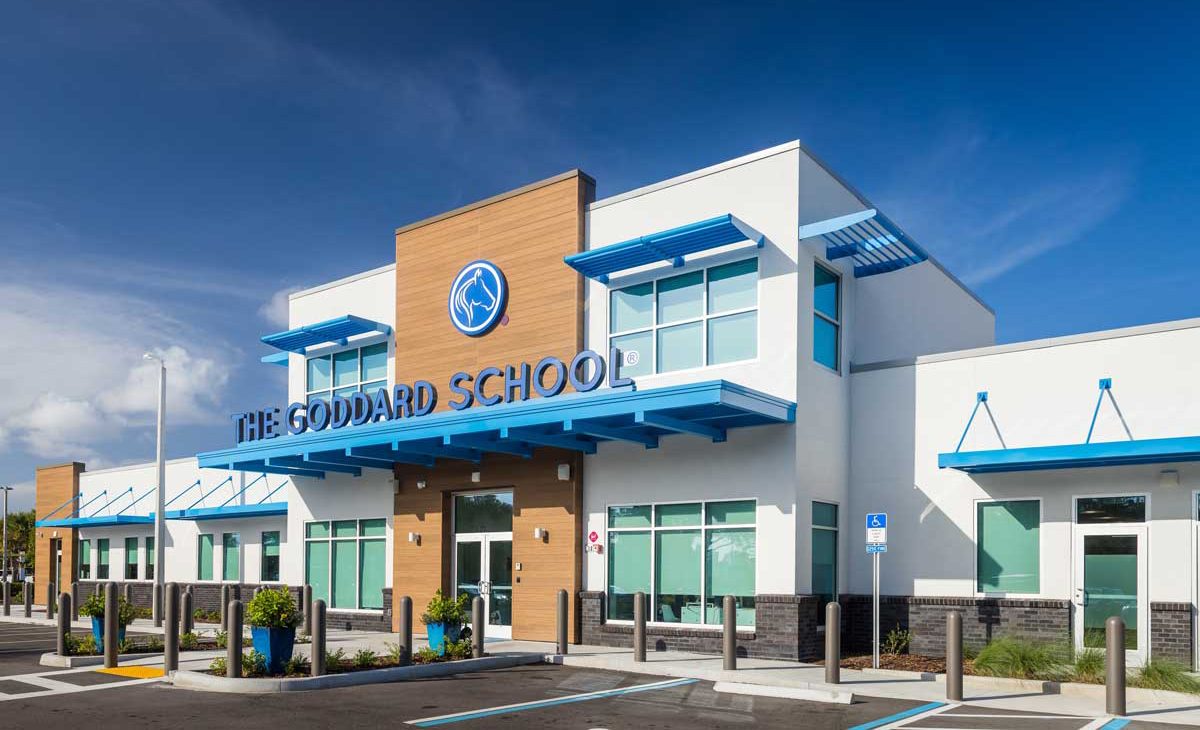When considering an investment in early childhood education, potential franchise owners often wonder what their daily reality will look like. To provide authentic insights into the Goddard School ownership experience, we spoke with two thriving franchise owners who shared their perspectives on everything from daily schedules to the most rewarding aspects of the business.
Daily Operations and Schedule Management
The beauty of Goddard School ownership lies in the flexibility it offers, though the level of involvement varies significantly based on your business model and stage of ownership.
Penny Chang, co-owner of The Goddard School of Kirkland, seamlessly balances her family priorities with an active, hands-on presence at the school, working in close partnership with her co-owner. "I have two young kids and I value my time with them in the morning and the ability to see them off to school," she explains. "I am at the school by mid-morning and there until 5-6 pm. Because I have a strong administrative team, I have the flexibility to work with my family's schedule, including working from home and leaving earlier as needed."
For multi-unit owners like Dipti Singh, who operates four Goddard Schools in Maryland and recently acquired a school where she serves as the primary on-site owner-operator, the schedule demands are different. "As an on-site owner-operator, my days are based on the needs of the business. I make sure I am at the school at either opening or closing times so I can have time with the parents and parents see that there is an on-site person with a vested interest. I end up doing anywhere between 30-45 hours per week. As a multi-unit owner, I play the role of a mentor, so I schedule time with my ownership team at individual schools and then work remotely from either home or the school I am on-site for. Currently, I start my day between 8-8:30 am and work until 6-7 pm," Singh notes. "The hours depend greatly on where a franchisee is in their lifecycle of owning a school and what they want to focus on."
Singh emphasizes the importance of commitment during the early stages: "The first few months to the first year and a half, you need to be willing to put the time in working on enrollment and establishing the brand and high-quality reputation in your community. You can then cut back to 5-7 hours a day, but not initially."
The Three Main Daily Focus Areas
Both owners identified distinct primary responsibilities that shape their daily routines:
For Single-Unit Owners (Penny Chang):
- Tours, Business Development, and Marketing: "We offer tours every weekday and I give the majority of the tours for our school. I am also responsible for our marketing efforts, including social media campaigns. I have a business development background and it's one of the strengths I can contribute to the school."
- Family Communication and Management: "Relationship management with the families and with our staff is extremely important to me."
- Flexible Time for Urgent Matters: "It’s important not to overschedule commitments during my time onsite. I leave room in my schedule each day just in case urgent matters arise and decisions need to be made in a timely manner. Every day can look different, so it helps to be able to pivot and adjust as needed."
For Multi-Unit Owners (Dipti Singh):
- Coaching and Mentoring Partners: "Coaching partners (the other on-site operators of the schools) -- we discuss upcoming enrollment cycles, tuition increases, and mentoring."
- Quality Assurance Oversight: "When the Quality Assurance or Franchise Consultants are on-site, I will strive to be on-site. I also make sure to visit the school once a week to see the operations."
- Strategic Planning: "Advising strategically to ensure we are well-positioned for success."
Technology, Systems, and Support Infrastructure
Goddard School franchise owners benefit from comprehensive technological support that streamlines operations and provides valuable business insights. This robust technology infrastructure allows owners to focus more time on building relationships with families and staff rather than getting bogged down in administrative tasks.
Essential Technology Platforms
Both owners rely heavily on Goddard's integrated systems:
- FMS (Franchise Management System): Goddard's comprehensive CRM platform
- Tour Management System: Streamlines the tour scheduling process
- iGoddard Franchise Portal: Provides access to marketing tools and website management capabilities
- Reporting Dashboards: For owners to review KPIs of their business and identify opportunities.
"They provide turn-key tools for us to run every aspect of the school," Chang explains. "Tracking and identifying trends -- they have the biggest picture what is going on nationally and locally in our market. They are able to communicate what's working and what's not across the system."
Administrative Work Balance
Behind the scenes of every successful Goddard School is a franchise owner managing a wide range of operational and administrative responsibilities. From staffing and compliance to financial oversight and strategic planning, the role can vary significantly depending on the owner’s model and number of locations.
Chang dedicates about "20 hours" per week to administrative and strategic planning work, striving "to do this type of work while I'm at the school so I don't have to take it home."
Singh's multi-unit model requires a different approach: "I would say I spend half of the time on administrative items and the other half of the time advising the on-site operators."
Staff Management and Educational Excellence
Thriving Goddard School operations depend heavily on building strong leadership teams and maintaining high educational standards. Franchise owners play a critical role in setting the tone for school culture, ensuring staff feel supported, and aligning daily operations with the broader mission of providing exceptional early childhood education. Their ability to lead effectively behind the scenes directly impacts the experience of both teachers and families.
Chang emphasizes the collaborative nature of her leadership approach: "We have a strong School Director, an Assistant Director of Operations, and Education Program Manager along with my co-owner on the administration team. They play a big role in our daily operations and we all work together as a team, each playing off of each other's strengths."
For hiring and training, Chang delegates to leverage expertise: "The School Director does this. I want this position to employ to everyone's strengths and our school director is the childcare expert. The director is provided with great resources, i.e., an entire toolkit that helps lead them through the hiring and staff orientation process, including professional development planning."
Singh's multi-unit model requires different delegation: "The on-site operators and primarily the directors do the hiring. I am more involved in the policy-making process; dress code to health benefits to retirement plans to salary ranges based on qualifications and location of the school."
Parent Relations and Community Building
Building strong relationships with families forms the cornerstone of thriving Goddard School operations, with both owners prioritizing personal connection and communication.
Communication Strategies
Chang's approach emphasizes face-to-face interaction: "In-person -- this is my number one method and the one that families and I prefer. It's important that they see an owner’s face in our school. I have a vested interest in their family and their child succeeding."
Her comprehensive communication strategy includes:
- Daily in-person interactions during pickup and drop-off
- Social media engagement
- Regular check-in calls with new and existing families
- Proactive follow-up on family feedback surveys
"It is important for me to consistently say 'hi' to the school's families and connect with them about their lives," Chang notes, highlighting the personal investment that sets franchise ownership apart.
Singh reinforces this principle: "Being on-site is crucial -- parents feel so much more secure when they see you are on-site."
The Franchise Owner Experience: Challenges and Rewards
Owning a Goddard School franchise is more than a business venture, it’s a deeply personal journey that blends professional growth with purpose-driven work. Each franchise owner brings their own perspective to the role, but many share common themes when reflecting on what makes the experience so meaningful. From the emotional rewards of nurturing children and supporting families to the inevitable challenges of staffing and scaling, the franchise journey is filled with valuable lessons, moments of pride, and a few unexpected surprises.
Most Rewarding Aspects
The emotional rewards of Goddard School ownership consistently emerge as the most fulfilling aspect for both owners.
Chang describes the long-term relationship building: "Seeing the family throughout the years and essentially growing up with the family. Experiencing their first months as a baby to attending graduation and being part of their healthy and joyful development. It's rewarding to have parents validate the high-quality education that we provide."
Singh finds additional fulfillment in recognition and growth: "Winning awards like the Circle of Excellence from The Goddard system and being accredited and highly sought after for quality early childhood education. As a multi-unit owner, it's been rewarding to provide opportunities to the partners who are on this journey with me. And of course it is also financially rewarding.”
Biggest Challenges
Both owners acknowledged unique challenges in their franchise journey, shaped by the timing of their openings, the scale of their operations, and the evolving demands of the early childhood education industry. From navigating staffing shortages to managing the growing responsibilities that come with multi-unit ownership, each obstacle tested their resilience and adaptability.
Chang faced timing challenges: "It is much easier now, but we opened during COVID. We saw early childhood education professionals exit from the industry, and it was difficult to find experienced staff."
Singh highlighted the responsibility aspect: "We have children's lives in our hands, and that is a great responsibility. Any time something does not go as planned, it is an opportunity to learn and grow from it."
For multi-unit expansion, Singh noted: "It was a transition owning more than 1 school."
These experiences not only highlighted the complexity of running a Goddard School but also reinforced the importance of strong leadership and a clear sense of purpose.
Surprising Discoveries
Perhaps most telling are the unexpected positive aspects both owners discovered along the way—insights that go beyond business metrics and speak to the heart of their experience. While they anticipated the hard work and responsibility, what surprised them most was the depth of personal fulfillment and joy that came with the role.
Chang's enthusiasm is evident: "How excited I am to go to work! It's not just a 9-5 job. I am excited to see the children and our team every day. I know I am making a difference, and I can see the difference over time."
Singh was pleasantly surprised by the financial performance: "I didn't expect as much financial return. It is a feel-good business."
From finding daily motivation in the impact they make on children's lives to realizing greater-than-expected financial returns, these unanticipated rewards have become some of the most meaningful parts of their franchise ownership journey.
Financial Management and Business Growth
Behind every thriving Goddard School is a thoughtful approach to financial oversight and long-term growth. While each owner's role in day-to-day financial management can differ based on the size and structure of their business, maintaining a clear understanding of the numbers is essential to sustaining quality and profitability. Just as important, however, are the personal values and leadership qualities that drive decisions beyond the balance sheet. In this section, owners share how they manage financial responsibilities and what it truly takes to grow a purpose-driven business within the Goddard system.
Regular Financial Oversight
Financial management approaches vary based on the scale of operations. Chang maintains hands-on involvement: "Revenue and income -- I do the billing and statements -- it's a chunk of time, a few hours a month. My perspective is that financial management should be an owner’s responsibility and not delegated to the director, so that each can focus on their area of expertise.”
Singh takes a more strategic approach across multiple locations: "I manage it at a strategic level and compare the schools and trends. I expect the on-site owners to do all of the in-school financial planning and billing, and expenses."
Beyond the Numbers: Essential Owner Qualities
Both owners emphasize that Goddard School ownership requires more than business acumen. Chang stresses the importance of genuine commitment: "You need to have respect for education and the impact of our work on the children’s lives. You need to have the heart to take care of the brand. It's not just a business -- it's a Goddard community that you are building within your local community."
The flexibility of Goddard School ownership allows entrepreneurs to structure their involvement based on their goals, family priorities, and growth ambitions. Whether operating as a hands-on single-unit owner like Chang or scaling to multiple locations like Singh, the common thread remains the opportunity to make a meaningful impact in early childhood education while building a sustainable business.
As Chang perfectly summarizes: "What's great about being the owner is that you can choose how to best organize your time and what is most rewarding to you."
At Goddard School, we recognize that when our franchise owners flourish, children and families in their communities benefit directly. Our robust support framework demonstrates our dedication to equipping franchisees with the essential tools, resources, and knowledge required to excel in the fulfilling world of early childhood education. Through our streamlined technology solutions that simplify daily operations and our continuous mentoring and quality oversight programs, we establish the groundwork that enables owners like Penny and Dipti to concentrate on their core mission – fostering vibrant communities and developing young learners.
Are you ready to become part of our expanding network of thriving franchise owners? Reach out to us today to explore the Goddard School franchise opportunity and learn how you can forge your own meaningful journey in early childhood education.




